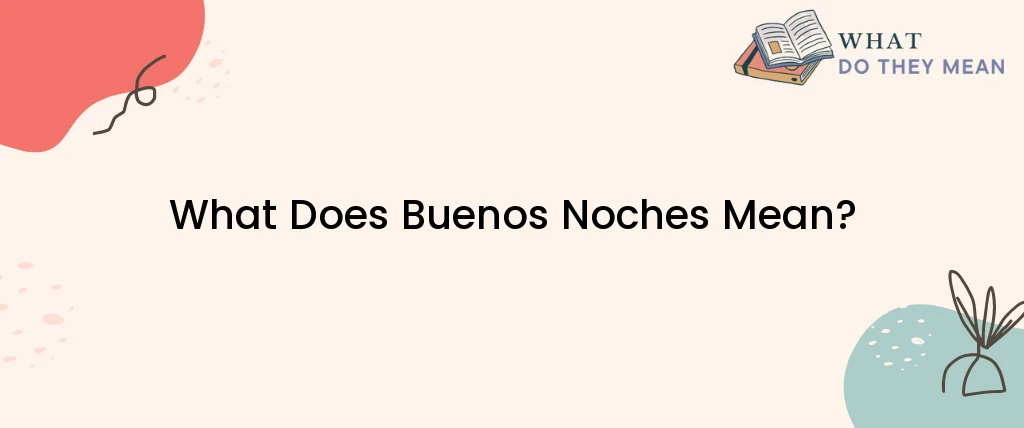Buenas noches is a Spanish phrase that is commonly used to say “good night” in English. It is a greeting that is used when someone is going to bed or leaving in the evening or at night. The phrase is made up of two words, “buenas” and “noches,” which translate to “good” and “night” respectively.
History and Origins of Buenos Noches
The Spanish language has been spoken in the Iberian Peninsula for more than 2,000 years. The language has evolved over time and has been influenced by various cultures and languages such as Latin, Arabic, and Greek. The phrase “buenas noches” is thought to have originated in Spain and has been in use for several centuries.
The use of “buenas noches” as a greeting or farewell is believed to have been influenced by the Catholic Church’s practice of saying prayers before going to bed. The phrase was used to wish someone a good night’s sleep and to ask for God’s protection during the night. Over time, the phrase became a common greeting and farewell among people.
Usage of Buenos Noches
“Buenas noches” is used as a polite way of greeting someone in the evening or at night. The phrase is commonly used when entering a room or meeting someone for the first time in the evening. It is also used as a farewell when leaving someone in the evening or at night.
The use of “buenas noches” depends on the level of formality and familiarity between the speaker and the listener. It is more formal than “adiós” (goodbye) or “hasta luego” (see you later) but less formal than “buenas tardes” (good afternoon). In a casual setting, people may simply say “noches” as a shortened version of “buenas noches.”
Etiquette of Using Buenos Noches
In Spanish-speaking countries, it is important to use the appropriate greeting and farewell depending on the time of day and the level of formality. Using the wrong greeting or farewell can be considered impolite or disrespectful.
When greeting someone in the evening, it is appropriate to use “buenas noches” instead of “Buenos días” (good morning) or “buenas trades” (good afternoon). Similarly, when leaving someone in the evening, it is appropriate to use “buenas noches” instead of “adiós” or “hasta luego.”
It is also important to use the appropriate level of formality when using “buenas noches.” In a formal setting or when meeting someone for the first time, it is best to use the full phrase “buenas noches.” In a casual setting or when speaking to someone familiar, “noches” can be used as a shortened version.
Alternative Greetings and Farewells
While “buenas noches” is the most common way to say “good night” in Spanish, there are several alternative greetings and farewells that can be used depending on the context.
- Descansa bien – This phrase means “rest well” and is commonly used as a farewell when someone is going to bed.
- Que sueñes con los angelitos – This phrase means “may you dream with the little angels” and is often used as a playful way of saying good night.
- Hasta mañana – This phrase means “see you tomorrow” and is commonly used as a farewell in the evening or at night.
- Buenas noches y dulces sueños – This phrase means “good night and sweet dreams” and is often used as a farewell to children.
Benefits of Learning Spanish Greetings and Farewells
Learning Spanish greetings and farewells such as “buenas noches” can be beneficial in several ways. First, it can help in building relationships and creating a positive first impression. Using the appropriate greeting and farewell can show respect and appreciation for the culture and language of the person being addressed.
Second, learning Spanish greetings and farewells can improve communication skills in Spanish-speaking countries. Using the appropriate greeting and farewell can help in establishing a rapport with the locals and can lead to a better understanding of their culture and customs.
Finally, learning Spanish greetings and farewells can help in improving language skills. It can enhance vocabulary, grammar, and pronunciation skills and can also help in developing a better understanding of Spanish sentence structure.
Conclusion
In conclusion, “buenas noches” is a Spanish phrase that translates to “good night” in English. It is a common greeting and farewell used when someone is going to bed or leaving in the evening or at night. It is important to use the appropriate greeting and farewell depending on the time of day and the level of formality. Learning Spanish greetings and farewells can be beneficial in building relationships, improving communication skills, and enhancing language skills.

As a researcher, I am curious and driven by the pursuit of knowledge. I approach my work with a critical eye, carefully evaluating sources and methods to ensure that my findings are accurate and reliable. Whether delving into scientific studies, historical records, or cutting-edge technologies, I am always seeking to expand my understanding and make new discoveries. I am dedicated to uncovering new insights and finding solutions to complex problems, and am driven by a passion for uncovering the truth.

